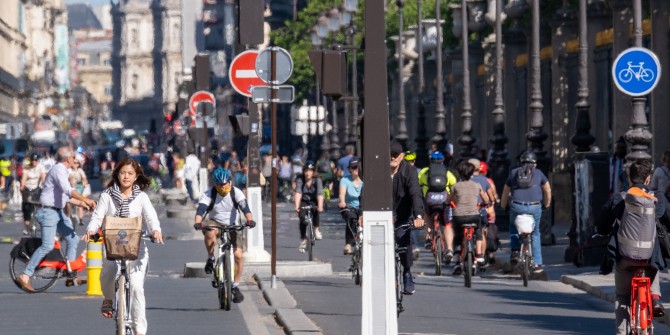What does ‘building back better’ actually mean? Nicholas Stern, Sam Unsworth, Anna Valero, Dimitri Zenghelis, James Rydge and Nick Robins (LSE) set out the actions the government needs to take to deliver a sustainable recovery.
The UK and the world have suffered disruption and hardship from the COVID-19 pandemic on an immense scale. Together with the tragic consequences of the health crisis, there is now a real risk of protracted global depression. Strong and timely action can increase confidence, steer expectations and channel productive private and public investment into a sustainable, inclusive and resilient recovery across the UK.

Such a recovery should be guided by a clear vision and strategy involving both the public and private sectors, and can be framed by and embody the government’s previously stated goals of levelling up across the UK; boosting productivity; investing in infrastructure; reaching net-zero greenhouse gas emissions by 2050; and forging a new role for ‘Global Britain’. This should be embedded in an understanding of, and commitment to, ‘building back better’.
Several critical actions by the government are needed to deliver a strong and sustainable recovery. These do not form an exhaustive list, but should be at the core of a coherent strategy and policy framework driving towards these goals across the entire economy. Furthermore, these actions and priorities are key to sustainable, resilient and inclusive growth in the UK beyond the recovery over the next few decades.
• A clear macroeconomic vision to restore confidence, create jobs and grow the economy out of post-COVID recession and debt by supporting activity in the short term and expanding productive capacity in the medium term. There will be a need to ensure fiscal and monetary policy work together to guide liquidity and savings towards the growth of productive sectors.
• Institutional reform to expand capacity, build back better, create new opportunities for all and manage long-run risks. This requires building a credible industrial strategy to drive the economy forward, rolling out new networks and ensuring all investment is compatible with a resource efficient, low-carbon economy. Policy reform is required, both to deal with the UK’s other pre-COVID challenges, and in order to make investments as productive and sustainable as possible. Measures should cover pricing and regulation, industrial policy, innovation, labour markets, skills and education, competition policy, and foreign policy. This programme of reform will also require devolution to deliver greater policy and fiscal autonomy to cities and regions, building on the Cities and Local Government Devolution Act 2016.
• Build capacity and resilience by investing in vital assets necessary for an innovative, prosperous and competitive economy. These are mutually enhancing and include:
o Physical capital, boosted by leveraging private finance through creating new markets and establishing a new National Investment Bank. The Bank could crowd in private finance and bring forward sustainable infrastructure projects at scale. Strategic investments in projects, such as retrofitting buildings to make them more efficient and resilient, can create new jobs now and build capacity, for instance in broadband infrastructure, for a smart, digital future. It could be established quickly and play an important part in the extensive refinancing necessary as we move into the recovery phase.
o Human capital, enhanced by creating the skills and jobs necessary for the 21st century.
This means reskilling workers to enable those affected by change to participate in the new economy – thereby ‘levelling up’ opportunities and regions by investing in people. This also includes avoiding labour market scarring by providing job guarantees – including in sustainable projects – for those at risk of unemployment, alongside investment in further education and lifelong learning. A strong focus on disadvantaged students, who risk falling further behind, should be central.
o Knowledge capital and innovation, fostered by accelerating the drive to reach a target for R&D investment of 2.4% of GDP through a mixture of increased funding and further incentives for business innovation, including enhanced incentives for clean innovation. The
government should accelerate the establishment of a clean innovation mission through a revised Industrial Strategy. It should also strengthen the UK’s research and development capabilities and collaboration between universities, industry and local policymakers. The UK’s research is a vital element in its comparative advantage and future as ‘Global Britain’. It is essential to enhance R&D and take more of it through to innovation.
o Natural capital, strengthened directly through carefully designed ecosystems creation, preservation and restoration projects. This means investing in land restoration, trees and water management and curbing pollution. This must be supported indirectly through projects such as active and accessible travel infrastructure which result in cleaner air, improved health and expanded green spaces. Reforms to agricultural support will play an important role.
o Social capital, enhanced by developing a vision and strategy for an inclusive and sustainable recovery that can gain support from businesses and communities and creates opportunities for all. There cannot be a return to austerity based on cuts in public spending and undermining the quality and resilience of public services. To achieve this, it will be important to involve local Mayors and key stakeholders with local knowledge in the design of the recovery package and to utilise the latest innovations in public participation, such as Citizens’ Assemblies. Consideration must be given to embedding sustainable behaviour such as virtual working and pedestrianisation of streets. Participation, equity and opportunity are interwoven with social cohesion.
A well-designed package for a sustainable recovery should help to redefine and strengthen the UK’s place in the world. As the UK assumes the leadership of the G7 and works to deliver a successful and ambitious COP26 in 2021, a domestic economic recovery that is strong, sustainable, inclusive and resilient will provide added credibility to foster and lead collaborative efforts to build global sustainability and resilience, and accelerate the transition to zero-carbon economic growth.
This is an extract from Strategy, investment and policy for a strong and sustainable recovery: an LSE, Centre for Economic Performance and Grantham Research Institute on Climate Change and the Environment briefing. It represents the views of the authors and not those of the COVID-19 blog, nor LSE.





3 Comments